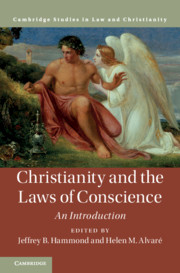Book contents
- Christianity and the Laws of Conscience
- Law and Christianity
- Christianity and the Laws of Conscience
- Copyright page
- Dedication
- Contents
- Contributors
- Acknowledgments
- Introduction
- Part I Themes in Understandings of Conscience in Christianity
- Part II Conscience According to Major Figures and Traditions
- Part III Applied Topics in Law and Conscience
- 15 Liberty of Conscience, Free Exercise of Religion, and the US Constitution
- 16 Religious Conscience Protections in American State Constitutions
- 17 Forced Conformity or Accommodation?
- 18 Christian Conscience and Sexual Expression Rights
- 19 Conscience and the Roman Catholic “Just War” Tradition
- 20 Institutional Conscience, Corporate Persons, and Hobby Lobby
- 21 Religion, Conscience, and the Law
- Index
- References
21 - Religion, Conscience, and the Law
Reasons, Bases, and Limits for Exemptions
from Part III - Applied Topics in Law and Conscience
Published online by Cambridge University Press: 12 June 2021
- Christianity and the Laws of Conscience
- Law and Christianity
- Christianity and the Laws of Conscience
- Copyright page
- Dedication
- Contents
- Contributors
- Acknowledgments
- Introduction
- Part I Themes in Understandings of Conscience in Christianity
- Part II Conscience According to Major Figures and Traditions
- Part III Applied Topics in Law and Conscience
- 15 Liberty of Conscience, Free Exercise of Religion, and the US Constitution
- 16 Religious Conscience Protections in American State Constitutions
- 17 Forced Conformity or Accommodation?
- 18 Christian Conscience and Sexual Expression Rights
- 19 Conscience and the Roman Catholic “Just War” Tradition
- 20 Institutional Conscience, Corporate Persons, and Hobby Lobby
- 21 Religion, Conscience, and the Law
- Index
- References
Summary
Kent Greenawalt discusses the permissibility, scope, and rationale for law to provide exemptions to protect religious and nonreligious conscience in the United States. It may be difficult for the law to determine which sentiments amount to conscience given differences in individuals’ perception and the strength of their convictions. Even the notion of a religious conscience is complex. Religious citizens’ conclusions about matters of interest to religion may proceed from both religion and reason, or only from reason. It is not clear what should count as religious, given differences between denominations and their ideas over time. There are a host of factors bearing on the permissibility and wisdom of granting exemptions, determining their scope, and deciding whether to extend protections to nonreligious conscience. A first principle is the importance of respect for others and for tolerance in a democracy. These questions about exemptions can be considered by looking closely at contested issues, like objection to the military draft, laws governing the manner of killing animals, ingestion of banned substances, abortion, and objection to insurance mandates concerning contraceptives.
Keywords
- Type
- Chapter
- Information
- Christianity and the Laws of ConscienceAn Introduction, pp. 414 - 434Publisher: Cambridge University PressPrint publication year: 2021

